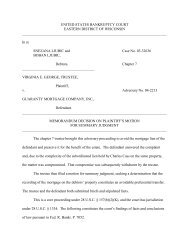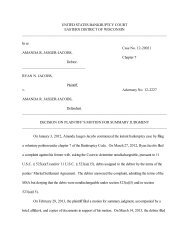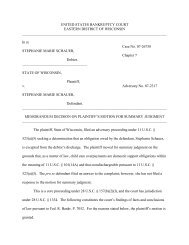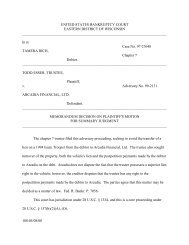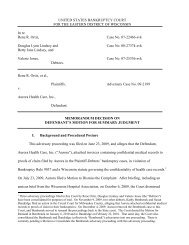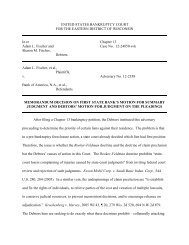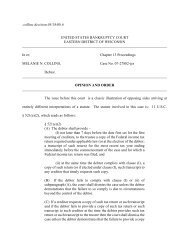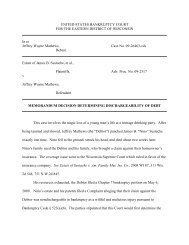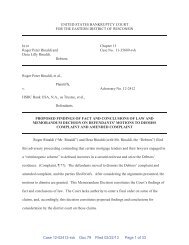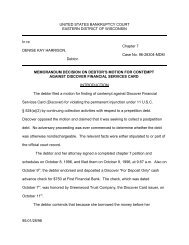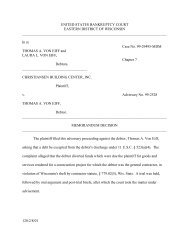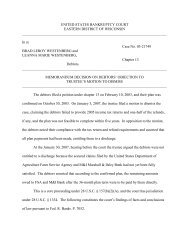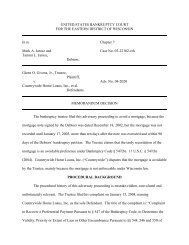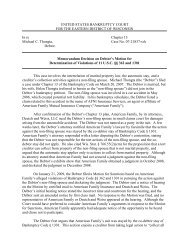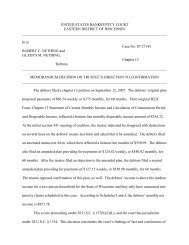In re American Toy & Furniture Co., Inc., Case No. 92-27686
In re American Toy & Furniture Co., Inc., Case No. 92-27686
In re American Toy & Furniture Co., Inc., Case No. 92-27686
Create successful ePaper yourself
Turn your PDF publications into a flip-book with our unique Google optimized e-Paper software.
entitled to superpriority status under 11 U.S.C. § 507(b), which grants such status to a secu<strong>re</strong>d<br />
c<strong>re</strong>ditor when the<strong>re</strong> is a failu<strong>re</strong> of adequate protection provided by the trustee, or in this case the<br />
debtor in possession, under §§ 362, 363 or 364. <strong>In</strong> <strong>re</strong> Becker, 51 B.R. 975, 978 (Bankr. D. Minn.<br />
1985). Section 507(b) provides:<br />
If the trustee, under section 362, 363, or 364 of this title, provides adequate protection of<br />
the inte<strong>re</strong>st of a holder of a claim secu<strong>re</strong>d by a lien on property of the debtor and if,<br />
notwithstanding such protection, such c<strong>re</strong>ditor has a claim allowable under subsection<br />
(a)(1) of this section arising from the stay of action against such property under section<br />
362 of this title, from the use, sale, or lease of such property under section 363 of this<br />
title, or from the granting of a lien under section 364(d) of this title, then such c<strong>re</strong>ditor’s<br />
claim under such subsection shall have priority over every other claim allowable under<br />
such subsection.<br />
11 U.S.C. § 507(b).<br />
According to <strong>No</strong>rwest, it must demonstrate the following elements to obtain superpriority status<br />
under § 507(b): (1) <strong>No</strong>rwest was a holder of a claim secu<strong>re</strong>d by a lien on property of the debtor;<br />
(2) <strong>No</strong>rwest was granted adequate protection under §§ 362, 363 or 364; and (3) notwithstanding<br />
such protection, <strong>No</strong>rwest has a claim allowable under § 507(a)(1), and by <strong>re</strong>fe<strong>re</strong>nce under<br />
§ 503(b), because the adequate protection <strong>re</strong>qui<strong>re</strong>d by imposition of the stay under § 362, the use,<br />
sale or lease of property under § 363, or the granting of a lien under § 364(d) was later found to<br />
be inadequate. See <strong>In</strong> <strong>re</strong> James B. Downing & <strong>Co</strong>., 94 B.R. 515, 520 (Bankr. N.D. Ill. 1988).<br />
<strong>No</strong>rwest asserts that it can satisfy these <strong>re</strong>qui<strong>re</strong>ments.<br />
The chapter 7 trustee opposes <strong>No</strong>rwest’s motion and contends that its claim is not entitled<br />
to superpriority status pursuant to § 507(b) because it does not arise under § 503(b); that is,<br />
<strong>No</strong>rwest’s claim is not a chapter 11 administrative expense. See <strong>In</strong> <strong>re</strong> Ralar Distributors, <strong>In</strong>c.,<br />
166 B.R. 3, 8 (Bankr. D. Mass. 1994), aff’d, 182 B.R. 81 (D. Mass. 1995), aff’d, 69 F.3d 1200<br />
82:2/24/97 -4-



